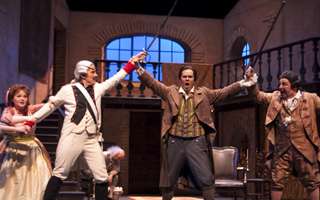|
Back
Passes, but Without Honors Phoenix
Symphony Hall
04/23/2010 - & April 24, 25 (Phoenix), and May 1, 2 (Tucson)
Gioachino Rossini: Il barbiere di Siviglia
Marian Pop*/Joshua Hopkins (Figaro), Peter Strummer (Bartolo), Patricia Risley*/Elizabeth DeShong (Rosina), Victor Ryan Robertson*/Brian Stucki (Count Almaviva), Kurt Link (Don Basilio), John Fulton (Fiorello/Sergeant), Grace Brooks (Berta), Rex Lambert (Ambrogio), Cameron Schutza (a notary)
Arizona Opera Orchestra and Chorus, Julian Reed (Chorus Master), Joel Revzen (Conductor)
Bernard Uzan (Stage Director), Doug Provost (Lighting Designer), David Gano (Set Designer), Anna Bjornsdotter (Costume Designer), Keri Muir (Stage Manager)

(© Courtesy of Arizona Opera)
Arizona Opera is closing its 2009/2010 season with the effervescent and popular Rossini opera, The Barber of Seville. Since the second performance in Rome in 1816, success has never subsided, eclipsing the "other" two versions, one by Giovanni Paisiello (1782), the other, by lesser known Maltese composer Nicolas Isouard (1796). The reasons? A brilliant score (albeit including numerous "self-plagiarized" passages, such as the overture, first written for his Aureliano in Palmira, then re-arranged for Elisabetta, regina d'Inghilterra), a good plot, truly comic situations, endearing, witty characters, and an abundance of occasions for singers to display bravura.
So, what do we get of all the above in this Arizona Opera presentation? Not much. Bernard Uzan's direction is conventional and unsurprising, yet it offers the advantage of swiftly moving the action. Sets and costumes are regulation and bland. What probably saves this overall lackluster production is the unquestionable comic talent of the cast, certainly not their musical performances. Peter Strummer is a savory, preposterous Bartolo. The voice, unfortunately, fails to carry through the house, with the presto section of his "A un dottor della mia sorte" showing signs of insufficient enunciation. The same goes with Don Basilio's "La calunnia." The voice does not project and Kurt Link resorts to "acting" his aria more than he actually "sings" it. Patricia Risley is an adequate Rosina. Her mezzo is velvety but high notes lack the necessary colors. All throughout she, too, displays stamina, warmth, along with some appropriate viperous tones. Marian Pop is the expected vivacious, ebullient Figaro and his musical rendition is more than acceptable. In "largo al factotum" Pop copes with the technical demands.
Not acceptable, conversely, are the cuts perpetrated in the score. Why, for example, deprive the spectator from the second part of Berta's agreeable song "Il vecchietto cerca moglie" in which Grace Brook's nice soprano does justice to the amputated arietta? And what about Almaviva's "Cessa di più resistere?" From the very first bars of his "Ecco ridente in cielo," just a few minutes into the opera, we realize that tenor Victor Ryan Robertson will not confront the challenges of this aria. Admittedly, the piece is fearsome and placed at the end of the work, but if one does not feel comfortable with virtuosity and stratospheric notes, why attempt Rossini? Cutting this number is musical dishonesty and unacceptable. We shall say no more.
Aside from acting, the other strong asset of this production is found in the pit. Musical Director Joel Revzen conducts a clean, polished performance. Arizona Opera Orchestra is well focused, precise, yet spontaneous.
If the "precaution" was "useless", the overall rendition, however, is not faultless.
Christian Dalzon
|